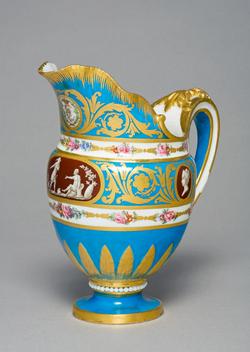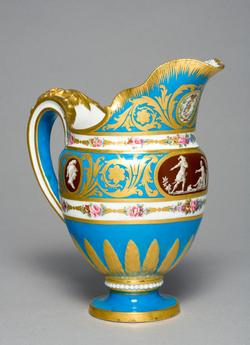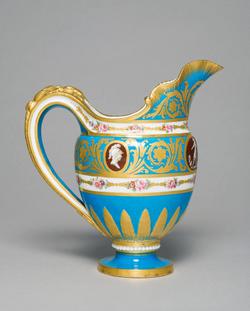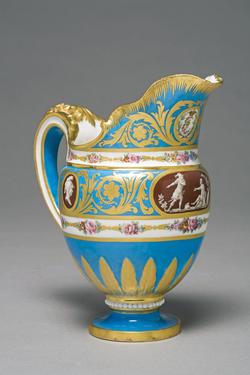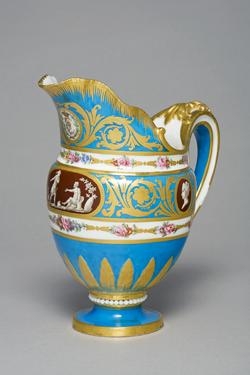Current Location: Gallery 26 (Lower Marlay)
Titles
Jug from the Empress Catherine II of Russia Service
Maker(s)
Factory:
Sèvres Porcelain Manufactory
Gilder:
Le Guay, Etienne-Henry
Entities
Categories
Description
Soft-paste porcelain jug, with bleu céleste ground, painting in enamels with medallions containing profile heads and a wreath enclosing EII, and gilded.
Soft-paste porcelain decorated with a bleu céleste ground, painting in blue, green, yellow, pink, mauve, red, reddish-brown, and pale brown enamels, and gilding The glaze on the interior has turquoise speckles here and there, and a few black ones in the bottom. The jug stands on a low, circular foot. The ovoid body contracts at the neck and then rises and flares out slightly to form a wavy-edged lip at the front. The handle springs from the rim and rises up slightly before curving outwards and downwards to meet the body at a point just above its junction with the foot. There is a band of white beading at the junction of the foot and body; stiff leaves in relief forming a calyx round the lower part of the body; and two husks and a cord in relief down the back of the handle. The ground is bleu céleste, interrupted above and below the widest point by two reserved white bands between narrow gilt lines, painted with sprays of polychrome flowers separated by two gold husks. The wide bleu céleste zone between them is decorated with gold rinceaux between which are two small and one large oval medallions, each painted en grisaille on a reddish-brown ground to resemble brown and white sardonyx cameos. The small medallions each contain a profile head: a Roman soldier and a young woman. The larger medallion has a scene with two Roman soldiers, the one on the right seated, probably Cincinnatus, and the one on the left standing. On the underside of the spout there is a circular reserve painted in polychrome with a wreath made up of two branches of different trees (? laurel and olive) tied with a bow at the bottom. At the top the branches meet on either side of a gold Imperial crown. Within the wreath is an E made up of flowers in monogram with II in gold, for Ekaterina II. The ground on either side is decorated with gold rinceaux. There is a gold band round the foot and a dentilated band and close-set strokes of different lengths round the lip. The leaves and husks in relief are gold and there are gold lines down the sides of the handles.
Notes
History note: The Empress Catherine II; Prince Potempkin; Tauride Palace; Empress Catherine II, Winter Palace, St Petersburg. Mallett & Son, from whom purchased in 1934 for £110 by Louis C.G. Clarke, MA, Cambridge.
Legal notes
L.C.G. Clarke Bequest, 1960
Measurements and weight
Height: 15.9 cm
Acquisition and important dates
Method of acquisition: Bequeathed
(1961-04-27)
by
Clarke, Louis Colville Gray
Dating
18th Century, Late
Louis XVI
Circa
1778
CE
-
1779
CE
Note
The designs for the service are in the Cabinet des Estampes de la Bibliothèque nationale, Paris, 'Dessins et devis au Service de porcelaine pour l'impératrice de Russie' (B.N., Lf 8 petit folio.)
This is one of six milk jugs from the ninety-six piece tea and coffee service which formed one part of the service made at Sèvres for the Empress Catherine II of Russia and despatched to St Petersburg in June 1779. The other part comprised the pieces for dining. The service was remarkable for its immense size, 797 pieces including the biscuit figures for table decoration, and the speed with which it was made. It was the first wholly neoclassical service to be made at Sèvres, and the forms were specially designed for it, the plates for example having smooth instead of lobed rims. The use of illusionistic cameos in the decoration reflected the Empress's interest in this aspect of antique art, and innovatory techniques were used to produce them .For descriptions of the service, see Savill (1988), Dawson (1994), and Peters ( 2005, III) Four of the jugs are in the Hermitage in St Petersburg (see Birioukova and Kazakevitch, (2005).
School or Style
Neoclassical
People, subjects and objects depicted
Components of the work
Decoration
composed of
enamels
( blue, green, yellow, pink, mauve, red, reddish-brown, and pale brown)
gold
Foot
Diameter 5.2 cm
Handle-spout
Width 15 cm
Gilding
Materials used in production
presumed lead-glaze
Lead-glaze
Soft-paste porcelain
Techniques used in production
Moulding
: Soft-paste porcelain, moulded, and decorated with a bleu céleste ground, painting in blue, green, yellow, pink, mauve, red, reddish-brown, and pale brown enamels, and gilding with tooled details
Lead-glazing
Inscription or legends present
Inscription present: interlaced L's
- Location: On base
- Method of creation: Painted in blue enamel
- Type: Factory mark
Inscription present: in script
- Text: LG
- Location: On base
- Method of creation: Painted in greyish-violet enamel
- Type: Gilder's mark
- Text: 16
- Location: On base
- Method of creation: Incised
- Type: Incised mark
- Text: B2 or BZ
- Location: On base below the 16
- Method of creation: Incised
- Type: Incised mark
Inscription present: E made up of flowers with II in gold
- Text: E II
- Location: On the side
- Method of creation: Inscribed
- Type: Monogram
References and bibliographic entries
Identification numbers
Accession number: C.47-1961
Primary reference Number: 93592
Stable URI
Audit data
Created: Saturday 6 August 2011
Updated: Monday 25 March 2024
Last processed: Thursday 14 August 2025
Associated departments & institutions
Owner or interested party:
The Fitzwilliam Museum
Associated department:
Applied Arts
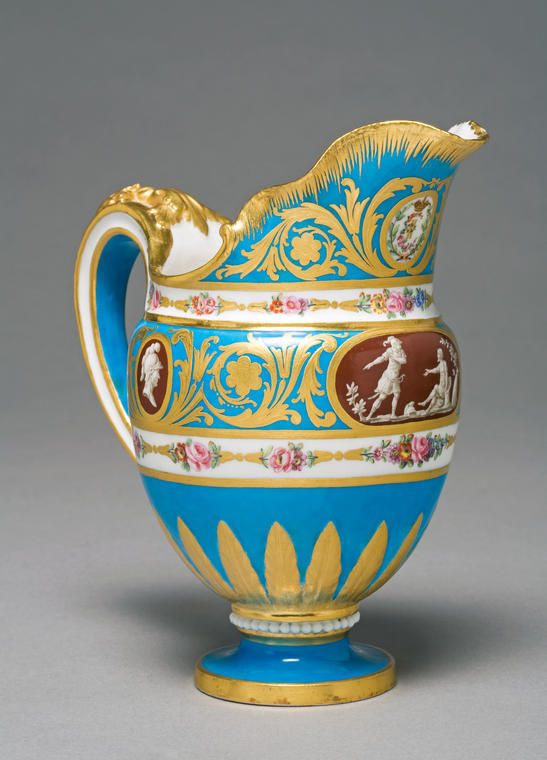
 IIIF Manifest
IIIF Manifest
